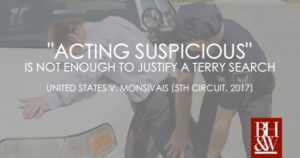Does an Officer’s Testimony That a Person was “Acting Suspicious” Establish Reasonable Suspicion to Support a Terry Stop?
 The Fifth Circuit Court of Appeals recently handed down an opinion concerning the reasonable suspicion standard required for law enforcement officers to conduct a Terry stop—an exception to the warrant requirement. The issue facing the Court was whether merely “acting suspicious” is enough to establish reasonable suspicion to justify a law enforcement officer to initiate a Terry stop.
The Fifth Circuit Court of Appeals recently handed down an opinion concerning the reasonable suspicion standard required for law enforcement officers to conduct a Terry stop—an exception to the warrant requirement. The issue facing the Court was whether merely “acting suspicious” is enough to establish reasonable suspicion to justify a law enforcement officer to initiate a Terry stop.
United States v. Monsivais, 848 F.3d 353 (5th Cir. 2017)
The Facts — District Court Found the Terry Stop to be Lawful Based On the Defendant’s Demeanor, Remarks, and for Officer-safety Reasons
While on patrol in a marked police car, two officers observed Monsivais walking down the side of the I-20 interstate away from an apparently disabled truck. The officers stopped in front of Monsivais and activated the car’s emergency lights in order to ask Monsivais if he needed roadside assistance. As Monsivais approached, he ignored the officers and walked past their patrol car. At this point, the officers exited their vehicle, and asked Monsivais where he was going and if he needed any help. Monsivais told the officers he was heading to Fort Worth (even though his vehicle was pointed towards Abilene). During questioning, Monsivais appeared nervous and repeatedly placed his hands in his pockets; however upon the officer’s request, Monsivais removed his hands. Additionally, Monsivais responded politely to all of the officers’ questions. After approximately four minutes, one of the officers advised Monsivais that he was going to pat Monsivais down for weapons because of his behavior, inconsistent statements and for officer safety reasons. Shortly thereafter, Monsivais told the officer that he had a firearm in his waistband. The officer seized the firearm and Monsivais was later charged with possession of a firearm while being unlawfully present in the United States.
Monsivais filed a motion to suppress the firearm and other evidence, arguing that the officer violated the Fourth Amendment because he did not have reasonable suspicion to believe Monsivais was involved in criminal activity when he detained him. The district court denied Monsivais’ motion to suppress, holding only that the “consensual encounter was transformed into a lawful Terry frisk due to the Defendant’s demeanor, remarks, and for officer-safety reasons.”
The Court of Appeals Reversed the District Court’s Decision—Holding the Officers Lacked a Basis to Reasonably Suspect Monsivais of a Criminal Act
The Court first determined that the officer seized Monsivais for Fourth Amendment purposes when he told Monsivais that he was going to pat him down. At this point, the officer converted the roadside assistance “welfare check” into an investigative detention—otherwise known as a Terry stop.
“The Fourth Amendment generally requires officers to obtain a warrant before searching or seizing an individual.” However, pursuant to a narrow exception announced in Terry v. Ohio, 392 U.S. 1, 88 (1968), police officers may briefly detain a person for investigative purposes if under the totality of relevant circumstance they can point to “specific and articulable facts” that give rise to reasonable suspicion that a particular person has committed, is committing, or is about to commit a crime. United States v. Hill, 752 F.3d 1029, 1033 (5th Cir. 2014).
Here, the Court found that while Monsivais’ behavior might not have been typical of all stranded motorists, the officers could not point to any specific and articulable facts that Monsivais had committed, was committing, or was about to commit a crime before seizing him.
The court explained that Monsivais’ nervous demeanor alone was insufficient to create reasonable suspicion of criminal activity in order to justify a Terry stop. In fact, the Court gives little or no weight to an officer’s statement that a suspect appeared nervous. United States v. Portillo–Aguirre, 311 F.3d 647, 656 (5th Cir. 2002). Moreover, the Court held that evidence of Monsivais placing his hands in his pocket is of little significance. The Court noted that any number of people walking down the street might have their hands in their pockets. Additionally, the Court determined there were no inconsistencies in Monsivais’ story; and, even if there were, the inconsistencies would not connect Monsivais with any reasonably suspected unlawful conduct. Moreover, Monsivais’ choice to ignore the officers’ presence by merely walking past them, not fleeing, did not give rise to criminal activity.
In conclusion, the officer testified that he never suspected Monsivais was involved in any criminal activity, but rather that Monsivais was just acting “suspicious.” As such, the court found that the officer seized Monsivais without reasonable suspicion and that the evidence obtained from the unlawful seizure should have been suppressed.










